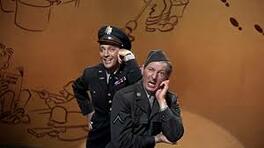weekly column
|
Each week, find a commentary on something connected to verses of Torah or another source of wisdom
|
|
Each week, find a commentary on something connected to verses of Torah or another source of wisdom
|
 The Numbers:13 Project This is the ritual for the nazirite: On the day that his term as nazirite is completed, he shall be brought to the entrance of the Tent of Meeting. Numbers 6:13 Every winter my wife and I have a friendly argument about which of Irving Berlin’s two Christmas movies is better – “Holiday Inn” or “White Christmas.” Both are filled with great music and mediocre music, classic production numbers, implausible plot twists and enough misogynistic, racist and classist imagery to fill an encyclopedia (whatever that is). I am a partisan of “Holiday Inn,” though I admit to loving Danny Kaye (who is in “White Christmas” only). I must acknowledge, however, that the ridiculous surprise near the end of the movie (a secret reunion of WWII veterans to cheer up their retired and depressed general) is very moving in that suspension-of-disbelief context. General Waverly, played by Dean Jagger, finds himself bumbling around a farm in Vermont ten years after the war. Bing Crosby goes on television to summon the troops, introducing his appeal with a musical question: What can you do with a general when he stops being a general? He sings about how the retired general is hailed for his service, but otherwise without function in society. (Never mind that Dwight Eisenhower was the president when the movie was made…) When Christmas Eve arrives, the veterans of General Waverly’s command suddenly appear in uniform and precision formation. Having been tricked into wearing his own uniform, the general reviews the troops and regains his sense of purpose (presumably). Perhaps it sounds a little ridiculous in today’s world where retired senior military officers wind up on faculties, corporate boards and White House staffs and the rank-and-file veterans are the ones looking for work, but the point is the same regardless of rank at the time of discharge. Those in military service – most especially those who answered duty’s call with a sense of purpose – find themselves casting about for ways to find fulfillment and meaning when their last tour comes to an end. It is not only about a decent job, but dignity and significance in employment is perhaps the simplest place to start. A combat service person serves in a particular type of way. The nazir, a man who takes on a regimen of physical self-denial for a period of his life devoted to God, serves in a very different way. Limited in time by this section of the Bible, when he finishes his service he is (as the verse says) brought to the entrance of the tent of meeting. There, he is initiated into a ritual that seems designed to remind him of what it is like to be a spiritual civilian rather than a monastic. (Look it up if you are unfamiliar.) It is not easy to go from a life of intensely regimented service to one of personal independence. I imagine that’s especially true if the higher purpose that guides your service is not so readily accessible outside the structure. It is the responsibility of those who were the beneficiaries of that service to welcome the veterans back into civilian life and to create a community in which that higher purpose finds some expression. I certainly do not mean to suggest that there is some pathology that afflicts service people or nazirites upon their discharge. In fact, the re-entry they experience is only a preview for everyone else. Sooner or later, everyone retires from their day job (and some do so frequently!). Love it or tolerate it, work provides context and meaning and a certain structure that becomes ingrained. When it is time to walk away, not merely for a little vacation or professional development, that sense of purpose and expectation may be hard to come by. And if the work environment is also a place of community, the transition is even more complicated. Very precious few of us will have Bing Crosby and Danny Kaye organize a surprise testimonial for us (or, I don’t know, Beyoncé and Ricky Martin). But each of us knows someone who has set aside some years of service and transitioned to a completely different kind of life. They need more than “thank you for your service,” more than an interest in who they were in that role. They need to know that the purpose they pursued has meaning outside the service for which they are being thanked. If for no other reason, we need to make for a society in which those ideas and ideals find tangible expression. That’s our role in showing appreciation to those who have set aside a time of their life to serve the rest of us. And may all your Christmases be white. Well, that’s the way both movies end, anyway.
0 Comments
Leave a Reply. |
Archives
October 2023
Categories |